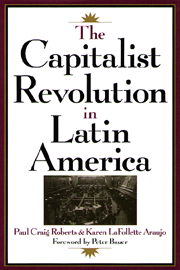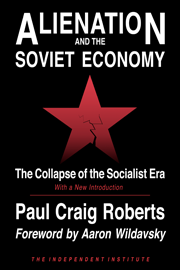Ever since the 1930s, "mainstream economists" have believed there is always some intervention the government can make in the private economy that will make everyone better off.
Under the influence of this belief, economic policy became a search for intervention points and a rationale for the growth of government power.
The assumption that government could always do more to improve things meant that government could never be too big.
Economists made this assumption because they assumed, illogically, that whereas a person in the private sector was acting in his own self-interest, the person in government was acting in the public’s interest. It never occurred to economists that "public servants" could, and would, use public policy for the private purpose of their own careers.
Instead, economists assumed the "ruthless" businessman who was appointed to public office underwent a transformation and became Christlike, working to save "the public interest" from the greedy colleagues he left behind in the private economy.
On no firmer foundation than this assumption, economists painstakingly built up vast areas of economics that are essentially worthless. They will be able to discard a great deal of baggage once they come to their senses and realize that public policy serves the self-interest of the policy-maker.
Economists have made some progress in realizing that public policy can be privately used. It’s no longer uncommon, for example, for economists to note that antitrust actions against a "dominant firm" are often instigated by unsuccessful or beaten competitors as a way of protecting themselves from losing market share.
Economists have pointed to the Justice Department’s antitrust case against Microsoft as an example of organized interest groups, in this case Microsoft’s competitors, capturing public policy and using it to serve their private interests at the expense of the public.
This analysis is more sophisticated than can be found in textbook treatment of monopoly and trustbusting, but it doesn’t go far enough. It assumes that Assistant Attorney General Joel Klein is not an independent actor with motives of his own, but a common property resource (like buffalo were for Indians) to be captured by the best hunter.
A better analysis would recognize that the person appointed as head of Justice’s Antitrust Division is going to use the powers of the office to advance his or her career. The powers of the office cannot be sold to the highest bidder, as that would bring prosecution. But the officeholder can identify a high-profile target and concoct a case. Complaints from Netscape, Novell, and Sun Microsystems – the organized interest group – are simply cover for Klein’s ambition.
We see prosecutors behave this way every day. Former Massachusetts Attorney General Scott Harshbarger made a political career by framing the Amirault family on child sex abuse charges. Attorney General Janet Reno’s career is based on false child sex abuse prosecutions; all have been overturned. Rudolph Giuliani used bogus financial cases for the name recognition that carried him to the mayoralty of New York and, he hopes, beyond.
We can observe the same phenomenon in local government. Many communities have garbage-recycling programs even though most economic studies show that such programs are a net cost to the taxpayer. Clearly, interests other than the public’s are being served.
Invariably, those interests are the yearnings of a "greenie" bureaucrat to "save the environment" regardless of cost, and the interests of politicians to build the public payroll by having three garbage collection crews – one for glass, one for newspapers and one for garbage.
The assumption that public policy serves a public interest, itself undefined, has no empirical foundation. It is an ideological artifact serving intellectuals who gain private emotional satisfaction from their worship of government as secular redeemer.
"The public interest" is a cloak for the private exercise of public power. This puts government failure in a new light.
Adam Smith used the metaphor of an "invisible hand" to explain how businessmen seeking profit end up serving consumers’ interest. But the powers of government differ from market power. It’s not possible to argue that an invisible hand guides the self-serving policy-maker to wield his power in ways unknown to him on behalf of a broader interest.
Government policy can do nothing but fail, because it lacks a market and price and profit signals to connect it to a wider interest.









